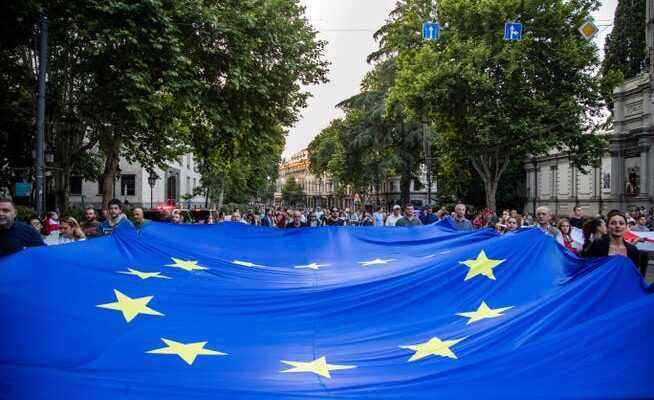Unlike Ukraine and Moldova, the South Caucasus Republic of Georgia has not yet received the status of an EU candidate. First, Georgian politics must meet conditions. The Georgians see the decision as unfair and short-sighted.
Tens of thousands marched through the Georgian capital Tbilisi last Monday to promote the path to the European Union.
Tbilisi’s boulevard, Rustaveli Boulevard, and the adjoining Freedom Square were filled with tens of thousands. The “Ode to Joy”, Europe’s anthem, rang out in the night sky. the Demonstration last Monday evening in Georgia’s capital was directed against its own government, but it was also intended to shake up decision-makers in the European Union. The population of Georgia does not want to be left behind when it comes to EU accession.
Confronted with Russia’s aggression for a long time
At first glance, the impressive rally didn’t help much. Unlike Ukraine and Moldova, the South Caucasian republic on the Black Sea has not yet received the coveted candidate status. To do so, she must first meet twelve conditions. There is great disappointment and a lack of understanding in Georgian society, where around 80 percent would like to join the EU.
For years, the country, which was under pressure from Russia, was considered a pioneer in the transformation of politics, economy and society after the collapse of the Soviet Union, after domestic political turmoil and wars. Some other post-Soviet states looked almost enviously at the Georgians and modeled themselves on reforms initiated, most notably, by the impulsive former President Mikheil Saakashvili.
Georgia is oriented towards the West, has been striving for years to join NATO and the EU and, not least because of this, has also taken part in the military operation in Afghanistan. More specifically, Georgia is at the forefront of Russia’s imperial appetites and attempts to exert influence over once-Russian and Soviet-held regions through violence, land grabbing and destabilization. In supporting the breakaway regions of Abkhazia and South Ossetia, Moscow is less interested in the fate of those living there than in the possibility of hindering Georgia’s connection to European institutions by attacking Georgia’s territorial integrity.
domestic tensions
Domestically, however, the country has been going through a turbulent phase for a long time. The longer the Georgian Dream party of billionaire Bidzina Ivanishvili, who has become rich in Russia, is in power, the sharper the political polarization. The opposition around the former governing party United National Movement of Saakashvili, who has since been imprisoned, accuses the Georgian Dream of pursuing a pro-Russian, socio-politically reactionary policy that restricts civil rights. Police crackdown on demonstrators Pressure on undesirable activists, journalists and politicians and backsliding in the rule of law have repeatedly sparked protests in recent years. There was also a lot to complain about in the elections.
Efforts by European diplomats to defuse the conflict have not always been successful. Against the background of the Ukraine war, the accusation made by the opposition that Prime Minister Irakli Garibashvili’s government wants to please Russia is explosive. All the more so since Georgia has become one of the most important refuges for journalists, civil rights activists and members of the opposition who are being harassed in Russia.
The EU is demanding that the Georgian government end political and social polarization, ensure the independence of the judiciary and stop pressuring political opponents, the media and civil society. In Georgia, some point out that the country is in many ways better off than Ukraine and Moldova, which have now been made candidates. The decision contributes to destabilization. The accusation is not only aimed at the EU, but also to their own governmenttheir omissions and setbacks.
Important strategic location
Prime Minister Garibashvili was defiantly euphoric: A historic decision had been made in Brussels; Georgia’s path towards the EU is safe. The government is mobilized to meet the demands in the expected timescales. Visiting Hungarian Foreign Minister Peter Szijjarto regretted the Brussels decision on Friday; it shows that the EU is measuring with unequal yardsticks, similar to how it is doing towards Hungary.
In view of the Russian aggression in Ukraine since February, there has often been talk in the EU that the West failed to recognize the signs of the times in the brief war in Georgia in 2008. It seems irritating and almost paradoxical that influential Western European politicians see Georgia’s EU ambitions as not currently a priority for the Union. At the same time, Georgia, with its location in the Caucasus on the threshold between resource-rich Central Asia and Europe and as a Black Sea border and also as a neighbor of Russia, is in a strategically no less important position.
